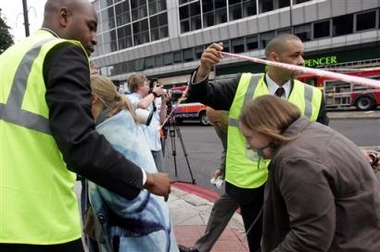


Posted by By JANE WARDELL, Associated Press Writer on



Three explosions rocked the London subway and one tore open a packed double-decker bus during the morning rush hour Thursday. The blasts killed at least two people and injured about 190 in what a shaken Prime Minister Tony Blair called a series of "barbaric" terrorist attacks.
Three explosions rocked the London subway and one tore open a packed double-decker bus during the morning rush hour Thursday. The blasts killed at least two people and injured about 190 in what a shaken Prime Minister Tony Blair called a series of "barbaric" terrorist attacks.
Blair said it was clear the attacks were designed to coincide with the opening of the G-8 summit in Gleneagles, Scotland. The prime minister said the meeting of world leaders would continue but that he would return to London.
"Whatever they do, it is our determination that they will never succeed in destroying what we hold dear in this country and in other civilized nations throughout the world," said Blair.
A group calling itself "The Secret Organization of al-Qaida in Europe" posted a claim of responsibility for the blasts, saying they were in retaliation for Britain's involvement in Iraq and Afghanistan. The Web statement, republished on the site of the German magazine Der Spiegel, could not be immediately confirmed.
Britain's Home Secretary Charles Clarke said there were three explosions in the subway and one on a bus. "We do not know who or what organizations are responsible for these terrible criminal acts," Clarke said.
Officials at hospitals surveyed by The Associated Press reported about 190 people treated for injuries following the explosions. A senior police official said about 150 people were seriously injured.
Deputy Assistant Commissioner Brian Paddick said the figure was based on reports from the London Ambulance Service. Police have confirmed that there were some fatalities but had not confirmed any numbers by early afternoon.
The blasts came one day after London was awarded the 2012 Olympics. Giselle Davies, a spokeswoman for the International Olympic Committee, said the committee still had "full confidence" in London.
Bloodied and bandaged witnesses reported panicked crowds fleeing the blast sites. A witness at the bus explosion said the entire top deck of the bus was destroyed.
Sir Ian Blair, London's police chief, said he was concerned the explosions were a coordinated attack but said he wouldn't speculate on who was responsible. He said officials had found indications of explosives at one of the sites.
Police reported "a number of fatalities" at one London subway station. "Things are still relatively confused," Superintendent John Morgan said.
Denying an earlier report, Israeli Foreign Minister Silvan Shalom said that Israel was not warned by Scotland Yard in advance of the blasts.
"We have been at a very high state of alert. Of course if there had been any kind of specific warnings we would have dealt with it," Blair said.
One witness, Darren Hall, said some passengers emerging from an evacuated subway station had soot and blood on their faces. He told BBC TV that he was evacuated along with others near the major King's Cross station and only afterward heard a blast.
Police confirmed an explosion destroyed a double-decker bus at Russell Square in central London.
Paul Woodrow, an official with the ambulance service, told reporters that rescue operations were ongoing and that "there are large numbers of casualties." Officials at the Royal London Hospital told BBC that 95 injured had been brought into that hospital alone.
Jay Kumar, a business owner near the site of the bus blast, said he ran out of his shop when he heard a loud explosion. He said the top deck of the bus had collapsed, sending people tumbling to the floor.
Many appeared badly injured, and bloodied people ran from the scene.
"A big blast, a big bomb," he told The Associated Press. "People were running this way panicked. They knew it was a bomb. Debris flying all over, mostly glass."
"I was on the bus in front and heard an incredible bang, I turned round and half the double decker bus was in the air," Belinda Seabrook told Press Association, the British news agency.
Police said incidents were reported at the Aldgate station near the Liverpool Street railway terminal, Edgware Road and King's Cross in north London, Old Street in the financial district and Russell Square, near the British Museum.
Bradley Anderson, a subway passenger, told Sky News that "there was some kind of explosion or something" as his train reached the Edgware Road station in northeast London.
"Everything went black and we collided into some kind of oncoming train," Anderson said.
Simon Corvett, 26, who was on an eastbound train from Edgware Road station, said: "All of sudden there was this massive huge bang."
"It was absolutely deafening and all the windows shattered," he said. "There were just loads of people screaming and the carriages filled with smoke.
"You could see the carriage opposite was completely gutted," he said. "There were some people in real trouble."
London's cell phone network was working after the explosions but was overloaded and spotty, limiting communication.
The explosions sent stocks plummeting in Europe, with several of the major indexes down 3 percent.
On March 11, 2004, terrorist bombs on four commuter trains in Madrid killed 191 people.

